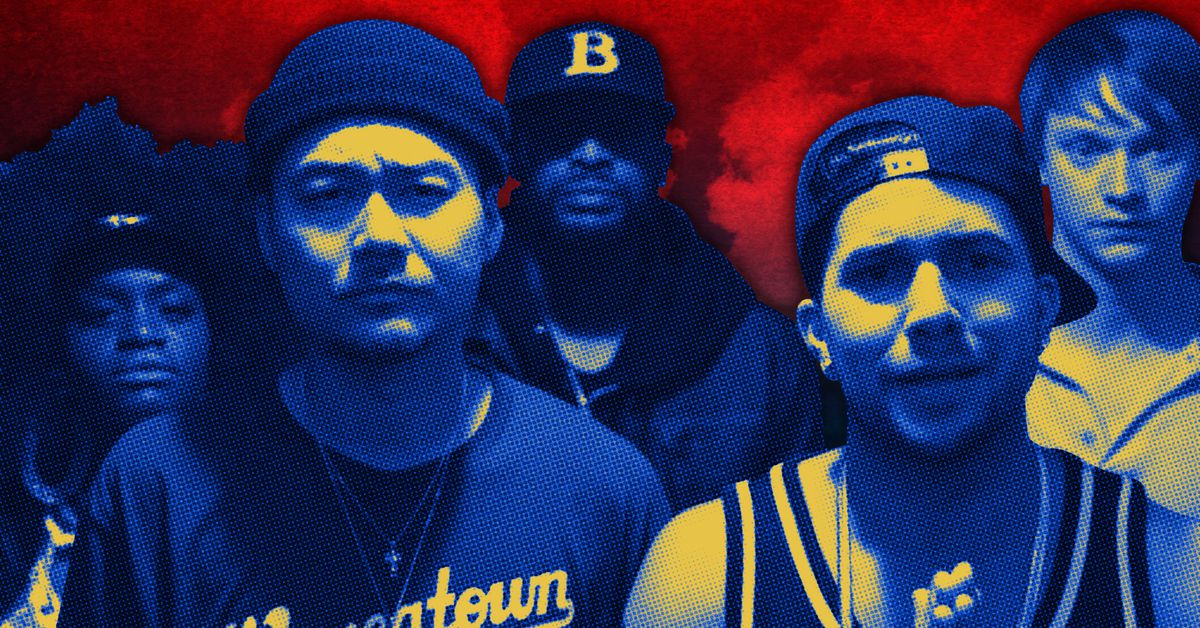Filed under:
The legendary music video director uses MC battles as a metaphor for our sociopolitical moment, when pure provocation and repressed hatred get crossed up in the name of performance
Last fall, when Joseph Kahn’s Bodied played in a midnight slot at the Toronto International Film Festival, I wrote: “If 2017 yields another film as ambitious, astonishing, and obnoxious … it’ll be a miracle, or maybe a catastrophe.” Cut to 14 months later and this motley battle rap satire— scripted by Toronto-based rapper Alex Larsen (a.k.a. Kid Twist) and featuring a cast of relative unknowns—remains undefeated. It speaks to Bodied’s astonishing ambition—and obnoxiousness—that it has no serious contenders when it comes to shadowboxing against our cultural moment. If I can exercise Torontonian privilege and invoke Larsen’s fellow six-shooter Drake, Kahn’s comedy has gone “Back to Back” as the American movie of the year.
I actually thought about Drake while watching Bodied for a second time— and I don’t usually think about Drake. Larsen’s screenplay is not set in the sphere of hip-hop stardom that Aubrey Graham occupies. Its characters sling rhymes on a smaller scale, competing in local throwdowns (the film is set in Oakland) and encountering fame and notoriety in the form of YouTube views rather than iTunes sales. (Appropriately enough, the movie is being distributed theatrically and online by YouTube Premium).
But even in this raucous, lawless context there are rules to the game, and ultimately Bodied’s plot pivots on a version of the violation that occurred this summer when Pusha T went after Drizzy’s mom and progeny in “The Story of Adidon”—a bristling diss track designed line-by-line (and in terms of its accompanying artwork) to go too far.
It’s not right to go too far into how closely Bodied’s climax (unintentionally) evokes aspects of “The Story of Adidon,” but one of the amazing things about this movie is how its twists have the power to startle even when you see them coming. For instance, it’s obvious from the very first scene, in which Berkeley grad student Adam Merkin (Calum Worthy), a white-and-nerdy type who has dragged his correspondingly Caucasian girlfriend (Rory Uphold) to a mostly African American rap battle, that Kahn is riffing on the prodigal-son subtext of 8 Mile. We know that Adam, whose name evokes Original Sin as surely as it does two-thirds of the Beastie Boys, is going to prove an unexpectedly devastating wordslinger if given the chance.
What’s harder to pigeonhole is what the character’s rise through the underground ranks signifies. Adam’s skill at stringing together politically incorrect putdowns is undeniable, as is his naked yearning for “respect” on terms his immediate social circle can’t confer. “You want a nigger pass,” theorizes Adam’s mentor, Behn Grymm (the phenomenal Jackie Long), citing a complicated cultural lineage that extends from Norman Mailer’s “The White Negro” to Marshall Mathers’s “White America” to the body-snatching, Obama-worshiping country club elites of Get Out. Are we watching a self-aware provocateur testing the limits of free speech or is he just spewing bile? Do his grinningly vicious exchanges with nonwhite combatants like the Korean American Prospek (Dumbfoundead)—who tells Adam “at least you knew I was Korean; that’s culturally sensitive by battle-rap standards” mere moments after the latter brought up tentacle porn and cat-eating in the heat of combat—establish a kind of common ground, or reinforce the polarized psychic geography of a nation’s sunken places? Is it OK to laugh at any or all of this? You could “Lose Yourself” in the contradictions.
Related
If you’ve followed Kahn’s career, you know he’s signed his name to some of the best music videos of the millennium; if you follow him on Twitter, you know that he’s a combative presence. Last year, he risked the wrath of the Beyhive when he suggested that Beyoncé’s “Formation” video copied his own clip for Taylor Swift’s “Bad Blood” and then doubled down that it was his right to defend himself against all haters. Look what you made him do.
As the rare music video director in demand enough to have worked with Swift and Beyoncé—as well as U2, Wu-Tang Clan, and Britney Spears —Kahn is as equipped as anybody to weigh in on the aesthetics of the form, but he’s also earned a reputation as a guy who maybe says a little too much, especially (and maybe, ironically) about free speech. His habit of baiting “SJWs,” leveraged against his overt contempt for the #MAGA crowd, leaves him in a political no-man’s-land.
The flipside to this verbosity is that Kahn has historically quite literally put his money where his mouth is. The delirious horror-comedy Detention was a largely self-financed venture, and when I interviewed Kahn about it in 2013, he implied that the cost (about $10 million) pretty much broke him, especially since the movie flopped. I happen to adore Detention, a movie that plays stupid on the surface—it’s ostensibly about a serial killer on the loose in one of those glossy, post-Scream movie suburbias —but is deeply smart about pop culture, beginning with its central, titular metaphor. In a brilliantly choreographed long take, Kahn follows a single, hoodie-clad student through two accelerated decades of detention while the hairstyles, clothes, and cell phone devices of the kids around him keep a-changin’—the progress and purgatory of pop culture, etched with flair.
In Detention, Kahn’s bright, fleet, visual style was deployed in the service of genre parody, à la Edgar Wright. If its mix of humor and homage made it the director’s version of Hot Fuzz, Bodied is his Baby Driver, except that where Baby Driver thoughtlessly enshrines Ansel Elgort’s iPod-abetted insularity—and lets him off the hook for his criminal activities—Bodied thoroughly interrogates and sentences (with judge-jury-and-executioner-style ferocity) the (anti)hero’s virtuoso wordplay and the white privilege underwriting it. As much as Kahn uses the scenes at Berkeley to get in his digs at a student body fixated on microaggressions, what Bodied is really getting at is the absolute perversity of Adam’s belief, indirectly encouraged but never officially validated by Behn, that in the context of battle rap, anything goes. That means that entering the arena gives him that “Pass.” After all, like a vampire—and the slender, redheaded Worthy is as pale as Nosferatu—he got invited in.
Extend the idea of Adam as a ghoul feeding off a mixture of hood cred and resentment, and Bodied is more of a horror movie than Detention, creeping close to Get Out’s insights about the relationship between envy and appropriation. If you imagine battle rap as a metaphor for a performative real-world discourse, in which an insult comic commands both tens of millions of Twitter followers and a nuclear arsenal, Bodied’s underlying aims and targets come into focus. It’s not just the idea that words have consequences, but also that who says them, and to whom, is itself of consequence. Kahn may believe in free speech, but he’s also willing to test that belief. In the end, it’s a movie that simultaneously revels in a love of language—of rhythm, pun, and double entendre—while acknowledging its potential as a weapon of mass destruction.
Granted, I may be Torquing (sorry) my read of the movie to suit my own skepticism about the kind of ethos em-Bodied by Adam’s brilliance. Kahn, who is willing to engage with critics on Twitter to safeguard what he sees as his work’s ambiguity, might disagree that his film is fully a cautionary tale. (Armond White, who has long been one of Kahn’s biggest critical champions, read it differently—but then that’s his shtick). How else, though, can you take a movie that so boldly problematizes its own, irresistible underdog-hero formula, or that so gleefully takes its celebrity producer to task?
It’d be audacious enough to watch Bodied invert the climactic triumphalism of 8 Mile, where B-Rabbit shames his black adversaries (and wins the applause of an African American constituency) by suggesting he’s a more authentic product of Detroit’s impoverished assembly-line economy, without knowing that Eminem is literally Bodied’s producer. The credit indicates either that Em can take a joke, that he’s got a “Guilty Conscience,” or that he doesn’t realize how thoroughly the movie bearing his brand is putting him through the ringer.
With its hyperstylized color scheme and editing, strategic stunt casting (why yes, that is Anthony Michael Hall as a respected academic), and brazen, give-no-fucks ethos, Bodied isn’t nearly respectable enough to figure in the year-end awards conversation. That’s OK: You don’t make a movie like this to encourage—or receive—mass approval. The paradox of Kahn’s career is that he’s a pop-minded artist who makes music videos that penetrate the mainstream and movies that seek to puncture it. There will probably be plenty of people who will see Bodied as a provocation without a purpose—as a film so determined to corner every side of the argument about political correctness that it ends up saying not much at all, albeit at top volume and with more epithets per minute than any film since Do the Right Thing.
Fair enough: As Adam learns by the end of Bodied, saying what you want the way you want is a double-edged sword, an act of liberation that’s also a trap. The reason that the film resonates so strongly right now is not just because it conjures and channels the ephemeral, free-floating antipathy and nastiness that’s choked online and IRL dialogue, but because it makes it hard—much harder than it has to as a comedy being released into a commercial marketplace—to watch without feeling implicated, particularly if you’re a white male viewer.
At one point, an increasingly desperate and friendless Adam promises his girlfriend that he’s going to get his life together, and I thought of Jordan Peterson (another YouTube star who claims to be speaking truth to power) and also the Eminem of “Cleanin’ Out My Closet”—the one who apologizes and accuses out of both sides of his mouth.
Speaking of which: In a movie that boasts an amazing soundtrack of rap hits mixed in with the cast-performed, a cappella originals, the final music cue is a glorious punch line—the anti-grace note in a supervillain origin story to shame M. Night Shyamalan and maybe make MF Doom smile.
Check your inbox for a welcome email.
Oops. Something went wrong. Please enter a valid email and try again.
Rosenberg explains why this might be one of the most surprising events in history
Mallory and Joanna talk popular HBO shows and compile a sizeable list of book recommendations for any and all interested parties—give them a look!
Plus, writer-director Brandon Cronenberg joins to discuss his new film ‘Infinity Pool’
Bryan and Nora unpack some NFL playoff media topics, Jason Gay joins to discuss how Billy Packer’s career transformed college basketball, and more
Wosny Lambre is joined by Adam Friedland to talk about the Lakers, the similarities between soccer and basketball, Friedland’s career as a comedian and podcaster, and more
As always, Rachel and Callie are here to dish out and comment on any Bravo news of the week
An SB Nation affiliate site





